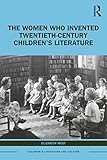
Price: £125.00
Publisher: Routledge
Genre: Non Fiction
Age Range: Books About Children's Books
Length: 260pp
Buy the Book
The Women who Invented Twentieth-Century Children's Literature
Venerable British publishing houses, it has been fairly said, were once run by men but serviced by badly paid women. Cruelly and inaccurately written off as ‘desiccated spinsters’ by Penguin Book’s historian J.E. Morpurgo, adoptive father of the more famous Michael, the more determined of these bookwomen often took advantage of their overlooked status to get on with creating their own empires. While their employers were having long lunches in the Garrick Club they were nurturing new talent, pressing for higher standards and finally coming up with good sales and critical success.
This present study describes their achievements, focusing on Eleanor Graham, Grace Hogarth, Kaye Webb and Julia MacRae. Space is also given to others also heavily involved in this transformation, in particular the inspired children’s librarian Eileen Colwell and writers Ursula Moray Williams, Kathleen Hale and Amabel Williams–Ellis, all of whom pioneered further innovation. While hardback books cost more than a pretty penny it was inevitable that target audiences remained those middle-class parents who could afford them. Once paperbacks arrived it was possible to start extending readership but Puffin Books’ first supremo Eleanor Graham generally preferred to stay with things as they now were. She rejected The Hobbit as too violent and turned down National Velvet fearing it might offend parents and teachers, especially those in convent schools. But her overall record in improving standards, particularly in the picture book world, is impressive.
She had no time for Enid Blyton, however, and her successor Kaye Webb shared similar misgivings about publishing Roald Dahl, eventually doing so only after pressure from above. For by now those in charge realised that a new golden egg had been hatched, with children’s books’ sales now sometimes subsidising the adult market. Inevitably this led to an emphasis on profit over quality, with former almost universally female editorial support for children’s writers increasingly replaced by interventions from tougher-minded sales managers. The world these bookwomen created was therefore eventually replaced, but it was good while it lasted and well deserves its celebration in Elizabeth West’s closely argued if hideously expensive book.



